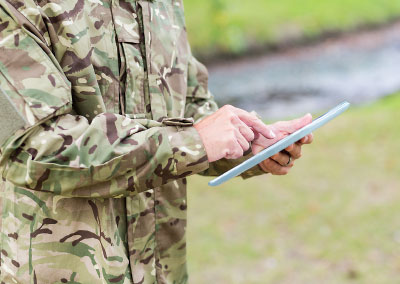Video-Enabled Tablets Improve MH Access for Veterans
Abstract
Psychotherapy appointments increased among veterans who received tablets as part of a Veterans Health Administration program.
A Veterans Health Administration program that provides video-enabled tablets to veterans who live in rural areas, lack transportation, or face other barriers to care improves both access to mental health care and continuity of care, a study in Psychiatric Services in Advance has found.

Josephine C. Jacobs, Ph.D., a health economist at the VA Health Economics Resource Center in Menlo Park, Calif., and colleagues compared the health records of 728 patients who received a tablet between May 2016 and September 2017 with those of 1,020 patients in a control group who did not receive a tablet. All patients had at least one mental health condition.
On average, tablet recipients participated in two additional psychotherapy appointments in the six months after receiving the devices, whereas psychotherapy visits declined for those in the control group. Tablet recipients had more encounters with mental health professionals regarding medications, were more likely to have participated in at least three psychotherapy visits in a six-week period (a measure of continuity of care), and missed or canceled a smaller proportion of their scheduled appointments than participants in the control group. There were no significant differences between the two groups in number of emergency department or urgent care visits.

“Virtual care may be appealing when veterans feel anxious in the VA setting or when they have other health issues that make it difficult to attend appointments in person.” —Donna Zulman, M.D., M.S.
“Mental health care may be particularly well suited to virtual modalities because in most cases therapy does not require a physical exam,” said study researcher Donna Zulman, M.D., M.S., a physician investigator at the Center for Innovation to Implementation in the VA Palo Alto Health Care System.
Zulman, an assistant professor in the Division of Primary Care and Population Health at Stanford University, noted the complex medical, mental health, and social challenges that many of the patients included in the analysis face: Approximately 75% of the patients had three or more chronic conditions, more than 31% had at least two mental health diagnoses, and roughly 42% had posttraumatic stress disorder. Furthermore, more than 42% lived in rural areas.
Want to Learn More About Military and Veteran Mental Health?
APA, in collaboration with the Society of Uniformed Services Psychiatrists, offers continuing medical education about military and veteran mental health. The courses are posted here and include the following:
Disaster Mental Health: Practical Applications of Disaster Mental Health—Lessons Learned From the U.S. Military
Assessment of Access to Weapons
PTSD: Pathophysiology, Treatment, and Military Aspects
Resilience of Military Children and Families
Suicide in the Military
APA offers additional resources here.
“It is easy to see how burdensome it might be to navigate such a high volume of health care, especially when the closest health care facility is an hour or two away,” Zulman told Psychiatric News. “For some of these patients, virtual care will be a challenge, but our findings suggest that for the patients who use tablets, the technology may facilitate critical access and continuity. In addition, the virtual care option can be appealing when veterans feel anxious in the VA setting or when they have other health issues that make it difficult to attend appointments in person.”
This study was supported by the U.S. Department of Veterans Affairs Rural Health Enterprise Wide Initiative and the eHealth Partnered Evaluation Initiative. ■
“Increasing Mental Health Care Access, Continuity, and Efficiency for Veterans Through Telehealth With Video Tablets” is posted here.



